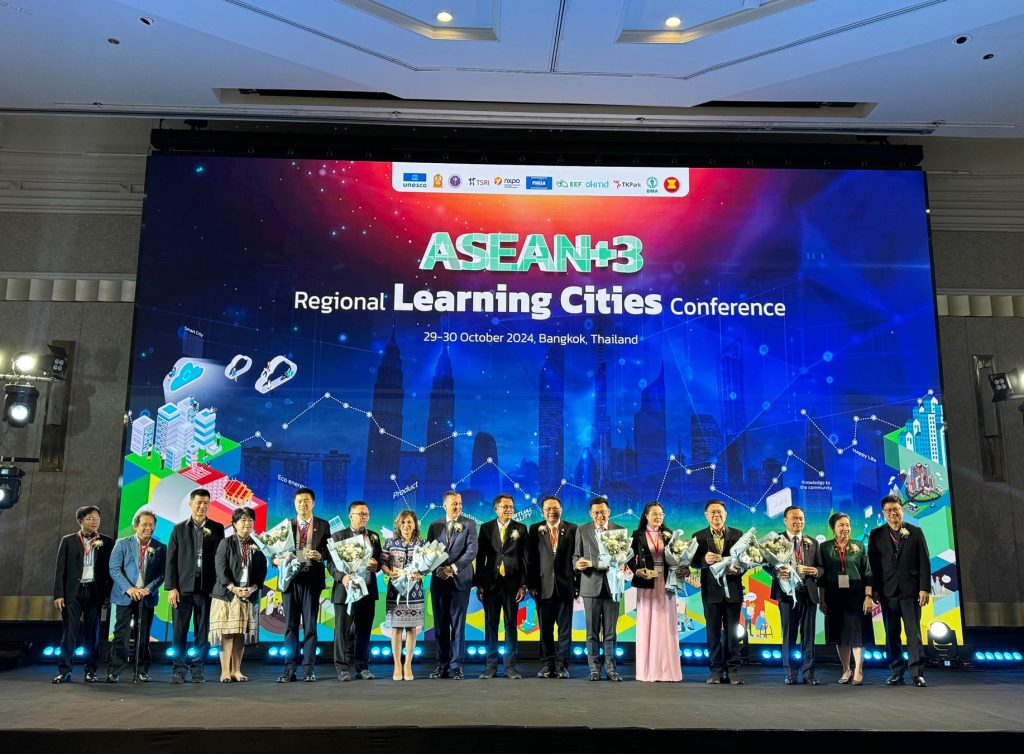Thailand, Bangkok, 29 – 30 October 2024
Thailand’s approach to the learning city concept, while aligned with UNESCO’s broader principles, showcases strategies and initiatives that reflect the country’s unique cultural, social and economic contexts. This reflects both national and local commitment to fostering a culture of lifelong learning and the building of inclusive and sustainable cities through join partnerships led by the PMU A, UNESCO Bangkok, the Equitable Education Fund (EEF) Thailand, Ministry of Education, Bangkok Learning City, Thailand Knowledge Park (TK Park) and the Office of Knowledge Management and Development (OKMD).

UNESCO Bangkok Regional Director Soohyun Kim congratulated seven municipalities across China, the Philippines, Thailand, and Viet Nam on their 2024 induction into UNESCO’s Global Network of Learning Cities, which now encompasses 356 cities in 79 countries.
Opening South-East Asia’s first regional conference on UNESCO Learning Cities in Bangkok, Ms Kim praised the new Learning Cities—Nanjing (China), Legazpi (the Philippines), Bangkok, Khon Kaen, and Yala (Thailand), and Ho Chi Minh City and Son La (Viet Nam)—for their ‘admirable commitment to making lifelong learning a reality for all their citizens.’ She added that these cities are ‘building pathways to knowledge, ensuring that learning takes place not only in classrooms but also in parks, streets, and homes.’
More than 250 policymakers, city officials, and education experts—including representatives from the seven newly designated UNESCO Learning Cities—gathered in Bangkok from 29 to 30 October 2024 for the first-ever ASEAN+3 Regional Learning Cities Conference. Participants from ASEAN member countries as well as China, Japan, and the Republic of Korea emphasized the need for enhanced collaboration and knowledge sharing among Learning Cities to address the twin challenges of the climate emergency and a global learning crisis that has left over 8 million youth out of school in South-East Asia alone. They highlighted the importance of promoting equitable access to lifelong learning opportunities to support inclusive and resilient communities.
Prof. Supachai Pathumnakul, Permanent Secretary of Thailand’s Ministry of Higher Education, Science, Research and Innovation, said, ‘We recognize that all [cities] have the potential to serve as learning platforms, where citizens of all ages can access knowledge and apply such knowledge to benefit themselves, their families, their communities, and their societies.’
South-East Asia, home to approximately 700 million people, is experiencing rapid urbanization. This urban growth is accompanied by pressing challenges—from climate change and natural disasters to social and labor shifts driven by advances in artificial intelligence. ‘As urban areas grow, so do the challenges and opportunities,’ said Raúl Valdés-Cotera, Chief Programme Coordinator at the UNESCO Institute for Lifelong Learning and Coordinator of the UNESCO Global Network of Learning Cities. ‘Lifelong learning is vital to unlocking the potential of South-East Asia’s cities, where over half the region’s population now lives.’
Dr. Kitti Satjawattana, Director of Thailand’s Program Management Unit on Area Based Development, said, ‘We need to be aware of the transformations to adjust, adapt, and make good use of such change…This requires the ability to skillfully manage the transformation and take advantage of the changes.’
Approximately 250 onsite participants, including representatives from UNESCO Learning Cities and interested cities in Brunei Darussalam, Cambodia, Indonesia, Lao PDR, Malaysia, the Philippines, Singapore, Thailand, Timor-Leste, and Viet Nam. Mayors and/or senior government officials promoting UNESCO Learning Cities in the Plus 3 countries of China, Japan, and the Republic of Korea, and the Australian Learning Communities Network. National and local Thai networks of 38 cities, including the Ministry of Higher Education, Science, Research, and Innovation, the Equitable Education Fund of Thailand, the Office of Knowledge Management and Development, Thailand Knowledge Park, and the Ministry of Education, with experts and researchers on learning cities and lifelong learning representatives from international organizations including UNESCO and UN-Habitat.

Timor-Leste National Commission for UNESCO (TLNCU) Participated first ASEAN 3 Regional Learning Cities Conference in Bangkok – Komisaun Nasional Timor-Leste ba Unesco
emwiqfmzx http://www.gp9v572jncu42d460tw8tdee610xv954s.org/
[url=http://www.gp9v572jncu42d460tw8tdee610xv954s.org/]uemwiqfmzx[/url]
aemwiqfmzx
affordable cheap gucci shoes men's BOTTEGA VENETA Curve
cheap cheap gucci shoes and clothes BOTTEGA VENETA Flash
cheap cheap gucci shoes from china BOTTEGA VENETA Curve
Drill And Tap Bit Set
Hot Waxing Machine Low Temperature Wax Melting Pot
Customized Wax Kit Quickly Melt Hair Warmer Wax Pot set
New Arrivals Portable Foldable Silicone Single Wax Pot
Car Mechanic Tool Set
Car Tool Kit Box
Portable Small Hair Remover Pot Wax Heater Warmer Machine
Air Impact Socket Set
portalventas.net
Car Tool Kit
New 200CC Capacity Waxing Machine Fast Heating Fast Melting
affordable cheap gucci shoes for women BOTTEGA VENETA Dot
affordable cheap gucci shoes BOTTEGA VENETA Flash
PABS Diethylaminopropyne Formate
PAP Propargyl Alcohol Propoxylate
K5 Pro Thermal Paste
Thermal Pad 1.5 Mm
Thermal Conductive Gel
cheap cheap gucci sweater men OFF-WH**E Bag 2205HT0008
affordable cheap gucci sunglasses Hermès Bags 2107YA0057
PME Propynol Ethoxylate
HD 3-hexyne-2,5-diol
affordable cheap gucci sweater mens OFF-WH**E Bag 2211HT0004
Thermal Pads Conductive Cooling
nextplanner.jp
HBOPS-Na Butynediol Sulfopropyl Ether Sodium
affordable cheap gucci socks Hermès Bags 2107YA0053
cheap cheap gucci suits Hermès Bags 2012SH0087
Silicone Roll Thermal Pad